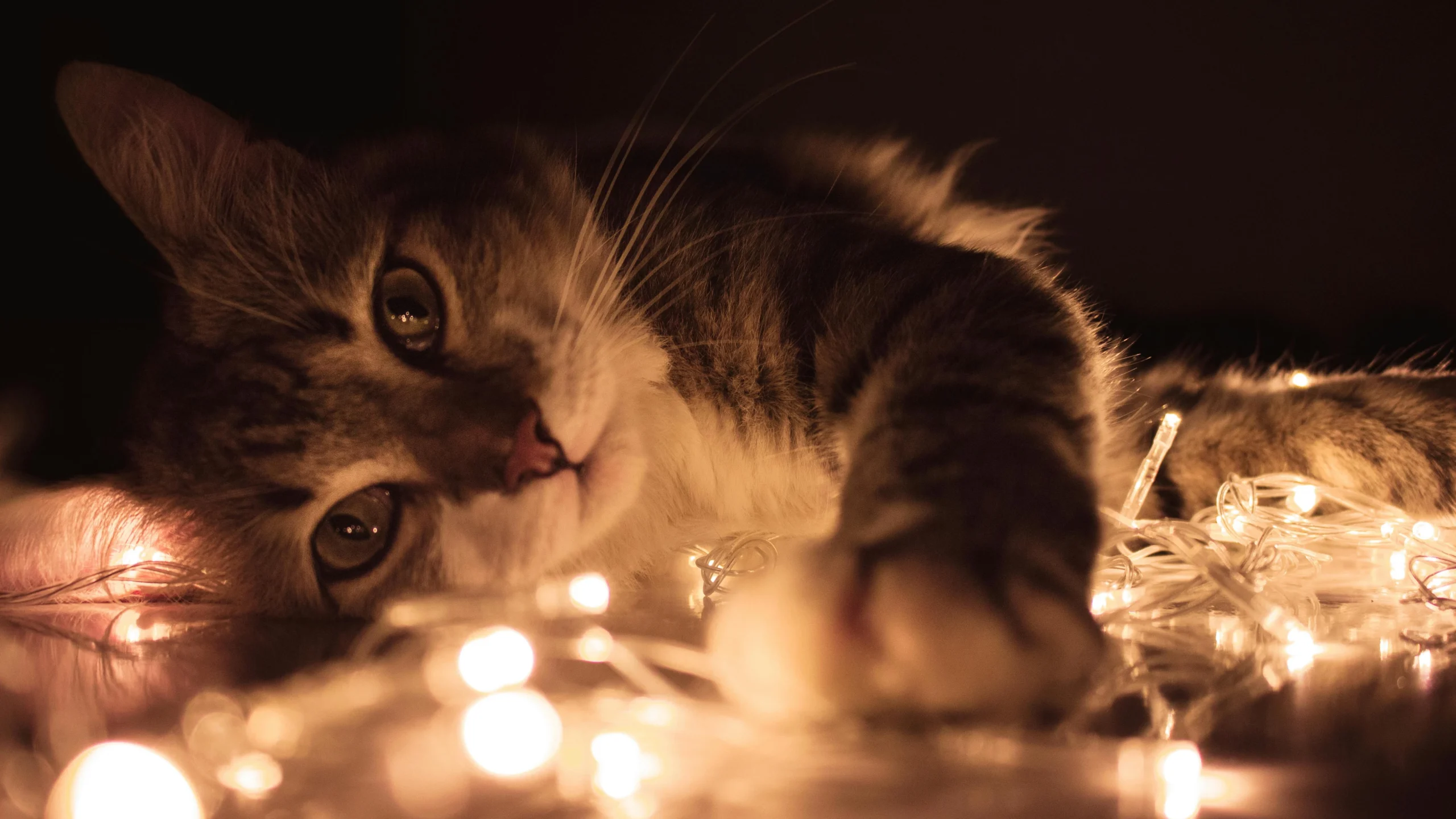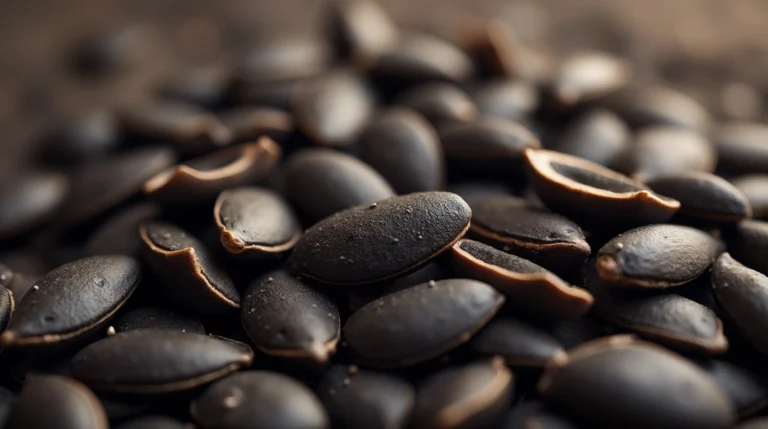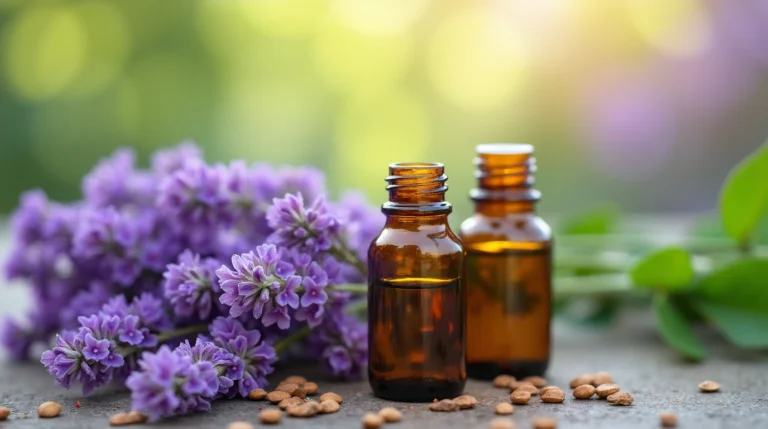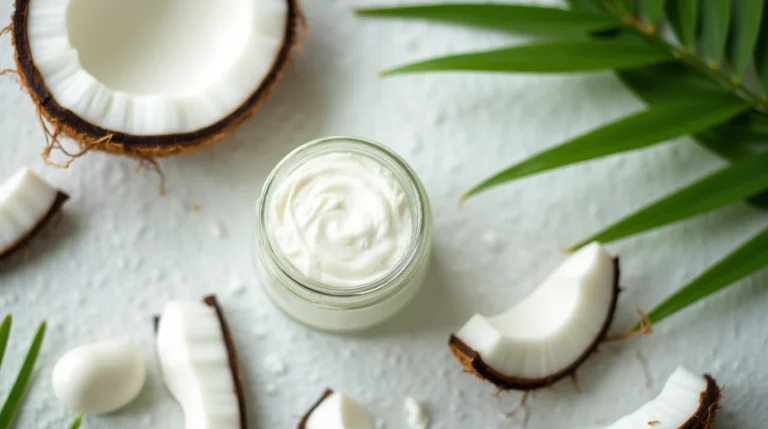Table of Contents
Have you ever wondered if your feline friend could benefit from the same healthy ingredients you enjoy? Many pet owners eye human foods like olive oil as a potential treat for their pets. While it’s natural to want the best for your cat, their dietary needs differ significantly from ours.
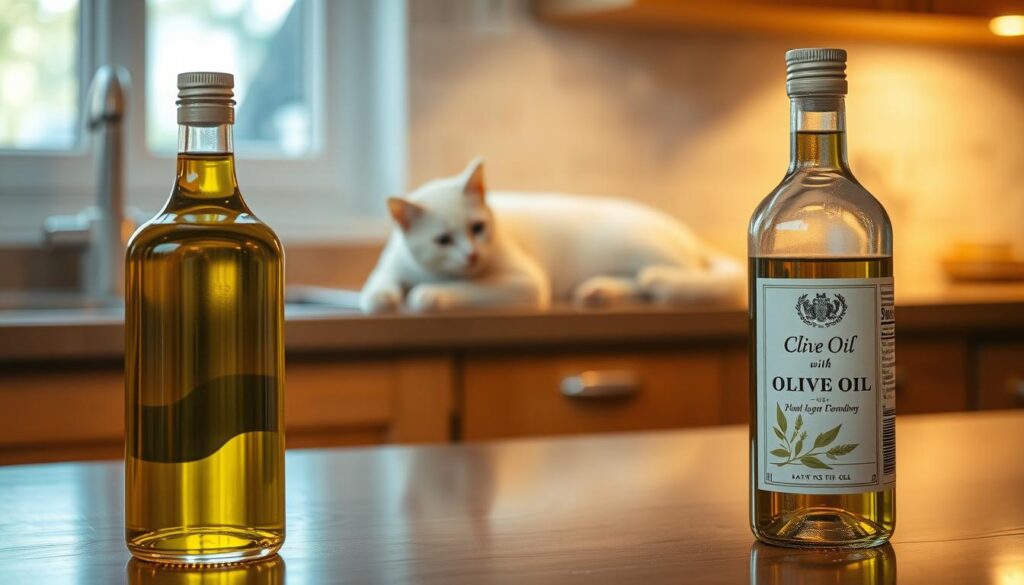
Cats are obligate carnivores, meaning their bodies thrive on animal-based proteins. Introducing human foods, even healthy ones, requires careful consideration. Small amounts of olive oil might offer benefits like a shinier coat or improved digestion. However, moderation is key to avoid potential issues.
This guide will explore the pros and cons of using olive oil for your cat. We’ll discuss dietary impacts, caloric concerns, and specific conditions like obesity. Always consult your veterinarian before making any changes to your pet’s diet.
Key Takeaways
- Cats have unique nutritional needs as obligate carnivores.
- Small amounts of olive oil may improve coat shine and digestion.
- Moderation is crucial to avoid health issues.
- Consult your vet before introducing new foods.
- Olive oil should not replace a balanced feline diet.
Understanding Feline Nutrition and Diet
Cats have unique nutritional requirements that differ greatly from humans. While you might enjoy a variety of foods, your feline friend thrives on a diet rich in animal protein. This is because cats are obligate carnivores, meaning their bodies are designed to process meat efficiently.
Unlike humans, cats rely on amino acid oxidation for energy. This metabolic pathway makes animal protein a non-negotiable part of their diet. Plant-based fats, such as those found in certain oils, are not essential for their health. In fact, introducing these fats can sometimes lead to digestive issues.
Commercial cat food is specifically formulated to meet these needs. It provides the right balance of protein, fats, and carbohydrates. Deviating from this balance can disrupt your cat’s health. For example, too much fat, even from healthy sources, can contribute to obesity or pancreatitis.
Research shows that cats require a diet with about 30-40% protein and 10-15% fat. This macronutrient distribution supports their energy levels and overall well-being. Always prioritize a balanced diet tailored to your cat’s specific needs.
The Nutritional Content of Olive Oil
Understanding the nutritional makeup of olive oil can help you decide if it’s suitable for your pet. This plant-based fat is 100% fat, making it calorie-dense. One tablespoon contains about 124 calories and 14 grams of fat, primarily monounsaturated fats.
Monounsaturated fats are known for their heart-healthy benefits in humans. However, your feline companion’s dietary needs are vastly different. Cats thrive on animal-based proteins, not plant oils.
Calorie and Fat Breakdown
Olive oil’s high fat content can be both a benefit and a concern. While it provides energy, excessive amounts can lead to weight gain or digestive issues. Cats require a diet with 10-15% fat, far less than what olive oil offers.
Vitamins and Antioxidants Overview
This oil contains vitamins E and K, along with antioxidants like polyphenols. These nutrients support skin health and reduce inflammation in humans. For cats, however, these benefits are minimal compared to their need for animal proteins.
While olive oil has some nutritional value, it lacks the proteins essential for your feline’s diet. Always prioritize a balanced, species-appropriate diet for your pet.
is olive oil safe for cats
When considering adding new elements to your pet’s diet, it’s essential to weigh the pros and cons. Research and expert opinions confirm that this plant-based fat is not toxic to felines. However, moderation is critical to avoid unintended health issues.
Small amounts can be a beneficial occasional supplement. For example, a tiny dose might improve coat shine or aid digestion. Yet, overuse can lead to problems like an upset stomach or weight gain. Always start with minimal quantities and observe your pet’s reaction.
Felines may experience adverse effects, particularly on their skin and gastrointestinal system. Too much can disrupt their natural digestive balance, causing discomfort. It’s crucial to monitor their response and adjust accordingly.
Consulting your veterinarian before introducing any new food is highly recommended. They can provide tailored advice based on your pet’s specific needs. This ensures your furry friend stays healthy and happy.
Potential Health Benefits of Olive Oil for Cats
Small dietary tweaks might enhance your cat’s overall health and appearance. When used in moderation, this plant-based fat can offer specific advantages for your feline friend. Let’s explore how it might benefit their skin, coat, and digestion.
Promoting a Shiny Coat and Healthy Skin
Adding tiny amounts of this ingredient to your pet’s diet may improve their coat’s shine and texture. The healthy fats it contains can help reduce dryness and dandruff, leaving their fur softer and more vibrant.
Many pet owners report noticeable improvements in their cat’s skin condition after introducing small doses. Research suggests that the monounsaturated fats in this ingredient can nourish the skin, reducing irritation and flakiness.
Improving Digestion and Reducing Inflammation
This plant-based fat can also act as a mild digestive aid. It helps lubricate the gut, making it easier for your pet to pass hairballs and maintain regular bowel movements. Some studies highlight its anti-inflammatory properties, which may soothe minor digestive discomfort.
Pet owners often observe better stool quality and fewer hairball issues after incorporating small amounts into their cat’s diet. However, it’s essential to use it sparingly to avoid overloading their system with excess fat.
| Benefit | How It Helps |
|---|---|
| Shiny Coat | Nourishes fur and reduces dryness |
| Healthy Skin | Alleviates dandruff and irritation |
| Digestive Aid | Lubricates the gut and reduces inflammation |
While these benefits are promising, remember that this ingredient should only serve as a supplement. Always consult your veterinarian before making changes to your pet’s diet to ensure it aligns with their specific needs.
Recognizing the Risks of Olive Oil in Cat Diets
Introducing new foods to your pet’s diet requires careful consideration of potential risks. While small amounts of this plant-based fat might offer benefits, overuse can lead to serious health issues. Understanding these risks helps you make informed decisions for your feline companion.
Digestive Issues and Gastrointestinal Upsets
One of the most common problems associated with excessive consumption is digestive discomfort. Your pet may experience symptoms like diarrhea, vomiting, or constipation. These issues arise because their system isn’t designed to process large amounts of plant-based fats.
Studies show that overloading your cat’s diet with this ingredient can disrupt their gut balance. Veterinarians often warn against frequent use, as it can lead to chronic gastrointestinal disturbances. Always monitor your pet closely if you decide to introduce this supplement.
Obesity and Pancreatitis Concerns
The high calorie and fat content in this food can contribute to weight gain if not used cautiously. Obesity in cats increases the risk of other health problems, such as diabetes and joint issues. Moderation is key to preventing these complications.
Pancreatitis is another serious concern. This condition occurs when the pancreas becomes inflamed due to excessive fat intake. Symptoms include lethargy, loss of appetite, and abdominal pain. If you notice these signs, seek veterinary advice immediately.
These risks highlight the importance of following precise dosing guidelines. Always consult your veterinarian before making dietary changes. Their expertise ensures your pet stays healthy and avoids unnecessary complications.
Guidelines for Safe Dosage and Administration
Ensuring your feline companion’s diet remains balanced while introducing new elements requires precision and care. When adding plant-based fats, it’s crucial to follow expert recommendations to avoid potential health issues.
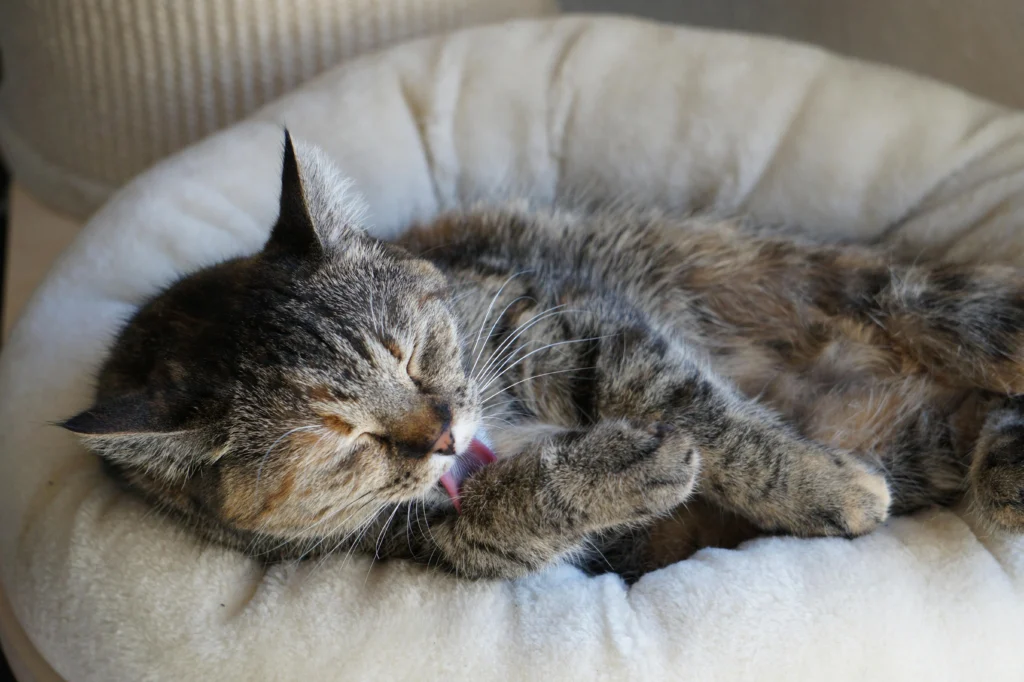
Recommended Serving Size
Experts suggest limiting the amount to no more than 1/4 teaspoon per day. This small dose provides benefits without overwhelming your pet’s system. Excess consumption can lead to obesity or digestive discomfort.
Gradual introduction is key. Start with a few drops mixed into their regular food. Observe their reaction before increasing the amount. This approach helps your cat adjust without stress.
Monitoring Your Cat’s Reaction
After introducing this supplement, watch for any signs of discomfort. Symptoms like lethargy, vomiting, or diarrhea indicate a negative response. If these occur, discontinue use and consult your veterinarian.
Regular monitoring ensures your pet’s well-being. Keep track of their weight and overall behavior. Adjust the dosage based on their activity level and existing diet.
| Step | Action |
|---|---|
| 1 | Start with a few drops mixed into food |
| 2 | Observe for 24-48 hours |
| 3 | Increase to 1/4 teaspoon if no adverse effects |
| 4 | Monitor weight and behavior regularly |
Always consult your veterinarian before making dietary changes. Their expertise ensures your pet’s health remains a top priority. A balanced diet tailored to your cat’s needs is essential for their long-term well-being.
Comparing Olive Oil with Other Feline Fats
Choosing the right fats for your cat’s diet can significantly impact their health and well-being. While plant-based options like this ingredient offer certain advantages, animal-based fats are often better suited to meet your pet’s nutritional needs. Let’s explore the differences to help you make an informed decision.
Nutritional Profiles: Plant vs. Animal Fats
Animal-based fats, commonly found in high-quality cat food, provide essential proteins and fatty acids. These nutrients are crucial for your pet’s energy, muscle development, and overall health benefit. In contrast, plant-based fats like this ingredient lack protein and may not fully support your cat’s dietary requirements.
Research shows that animal fats contain a balanced mix of saturated and unsaturated fats, which align better with feline metabolism. While plant-based options are rich in antioxidants, they can lead to an imbalanced diet if overused. Moderation is key to avoiding issues like obesity or digestive discomfort.
Caloric Density and Health Implications
This ingredient is calorie-dense, with a tablespoon containing around 124 calories. Excessive consumption can contribute to weight gain, increasing the risk of heart disease and other complications. Animal fats, while also high in calories, are more nutrient-dense and provide essential amino acids.
Studies highlight that a diet rich in animal fats supports heart health and maintains a healthy weight in cats. Plant-based fats, though beneficial in small amounts, should not replace these essential nutrients. Always prioritize a balanced approach to your pet’s nutrition.
| Fat Type | Key Benefits | Potential Drawbacks |
|---|---|---|
| Animal-Based | Provides essential proteins and amino acids | High in calories if overused |
| Plant-Based | Rich in antioxidants | Lacks protein, can lead to imbalance |
While both types of fats have their place, animal-based options are generally more appropriate for regular feeding. Consult your veterinarian to tailor your cat’s diet to their specific needs and ensure optimal health.
When to Seek Veterinary Advice
Monitoring your pet’s health after dietary changes is crucial for their well-being. While small amounts of plant-based fat might offer some health benefit, it’s essential to watch for adverse reactions. Allergic responses or digestive issues can signal a need for professional intervention.

Common symptoms of an allergic reaction include red eyes, patchy skin, or excessive scratching. Digestive problems like vomiting or diarrhea may also occur. These signs indicate your pet’s system isn’t tolerating the new addition well.
Early veterinary intervention can prevent more serious conditions like pancreatitis or heart disease. If your pet shows abrupt changes in appetite, lethargy, or unusual behavior, consult your vet immediately. These red flags require prompt attention to ensure your pet’s safety.
Maintaining an open line of communication with your veterinarian is key. They can provide tailored advice based on your pet’s specific needs. This ensures any dietary adjustments align with their overall health and well-being.
- Watch for allergic reactions like red eyes or patchy skin.
- Monitor for digestive issues such as vomiting or diarrhea.
- Seek immediate veterinary care for lethargy or appetite changes.
- Regularly consult your vet for personalized dietary recommendations.
User Experiences and Research Insights
Many cat owners have shared their experiences with dietary supplements for their pets. These stories, combined with expert research, provide valuable insights into the effects of certain fats in feline diets.
One pet owner noted,
“After adding a small amount of this supplement to my cat’s food, I noticed a significant improvement in her coat’s shine and texture.”
Others reported better digestive regularity, with fewer hairball issues and smoother bowel movements.
Research supports these observations. Studies suggest that controlled use of plant-based fats can reduce inflammation and improve skin health. However, experts emphasize moderation. Excessive intake can lead to digestive discomfort or weight gain.
In one case, a cat experienced mild vomiting after the owner increased the dosage without proper adjustment. This highlights the importance of careful monitoring and gradual introduction.
| Benefit | User Feedback |
|---|---|
| Shiny Coat | “My cat’s fur looks healthier and softer.” |
| Digestive Aid | “Fewer hairballs and better stool quality.” |
| Risks | “Overuse caused mild vomiting.” |
Overall, findings suggest that this supplement should be viewed as an occasional addition, not a dietary mainstay. Always consult your veterinarian to ensure it aligns with your pet’s specific needs.
Optimizing Your Cat’s Diet: Natural Remedies and Alternatives
Exploring natural remedies and dietary alternatives can enhance your cat’s health and vitality. While certain supplements offer specific benefits, it’s essential to balance them with your pet’s high-protein needs. This section dives into safe and effective options to complement their diet.
Supplement Options and Homemade Treats
Adding supplements like fish oil or probiotics can provide essential nutrients. Fish oil, rich in omega-3 fatty acids, supports skin health and reduces inflammation. Probiotics aid digestion, promoting a healthy gut. Always introduce these in small amounts to avoid digestive issues.
Homemade treats are another great way to enhance your cat’s diet. Simple recipes using cooked chicken or turkey offer high protein without extra calories. Avoid ingredients like onions or garlic, which can be harmful. These treats are both nutritious and enjoyable for your pet.
Diet Improvement Tips for Feline Health
Optimizing your cat’s diet involves more than just adding supplements. Focus on controlling calorie intake to prevent obesity, a common risk in indoor cats. Measure portions carefully and avoid overfeeding, even with healthy treats.
Incorporate a variety of protein sources to ensure a balanced diet. Rotating between chicken, beef, and fish can provide different nutrients. This approach supports overall health and keeps meals interesting for your pet.
Regular veterinary check-ups are crucial. Your vet can recommend specific dietary adjustments based on your cat’s age, weight, and health conditions. A compound approach, combining diet, exercise, and supplements, ensures long-term well-being.
| Option | Benefits | Risks |
|---|---|---|
| Fish Oil | Improves skin and coat health | Overuse can cause diarrhea |
| Probiotics | Supports digestive health | May not suit all cats |
| Homemade Treats | High in protein, low in additives | Require careful preparation |
While natural remedies and homemade treats can enhance your cat’s diet, moderation is key. Always consult your veterinarian to ensure these additions align with your pet’s specific needs. A balanced approach supports their heart health and overall vitality.
Conclusion
Balancing your cat’s diet with occasional supplements requires careful thought and expert advice. While small amounts of certain fats may offer benefits, moderation is key to avoiding risks like digestive issues or weight gain. Always follow precise dosage guidelines to keep your pet healthy.
Remember, supplements should never replace a balanced, high-protein diet tailored to your cat’s needs. Over time, excessive use can lead to calorie overload and other health concerns. Consulting your veterinarian ensures any dietary changes align with your pet’s unique requirements.
Optimizing your cat’s diet is a compound process that involves careful monitoring and professional guidance. Keep an eye on their reaction to new additions and adjust as needed. By prioritizing their well-being, you can enhance their health responsibly and safely.
Reflect on the insights shared here and always consult experts when planning dietary changes. Your cat’s long-term health depends on thoughtful, informed decisions.
FAQ
Can my feline friend consume this liquid fat?
Yes, but in moderation. It’s not toxic, but too much can lead to digestive issues or weight gain.
What are the benefits of adding this to my pet’s meals?
It may improve coat shine, support skin health, and aid digestion due to its healthy fats and antioxidants.
How much should I give my furry companion?
Start with a small amount, like a teaspoon, and monitor their reaction. Consult your vet for specific recommendations.
Are there risks associated with feeding this to my animal?
Overconsumption can cause gastrointestinal upset, obesity, or pancreatitis. Always introduce it gradually.
How does this compare to other fats in my cat’s diet?
It’s plant-based and rich in monounsaturated fats, while animal-based fats provide different nutrients like protein.
When should I consult a veterinarian about this?
If your pet shows signs of allergies, vomiting, or unusual behavior after consumption, seek professional advice.
Are there alternatives to this for improving my cat’s health?
Yes, options like fish oil, catnip, or high-quality protein treats can also support your pet’s well-being.
Can this help with my cat’s skin or coat issues?
Its fatty acids and antioxidants may promote a healthier coat and reduce skin dryness or irritation.
Is it suitable for all felines?
While generally safe, some cats may have sensitivities. Always introduce it slowly and watch for adverse reactions.
How often can I include this in my pet’s diet?
Use it occasionally as a treat or supplement, not as a daily addition, to avoid overloading their system with extra calories.

